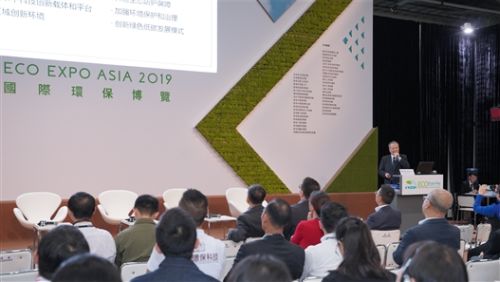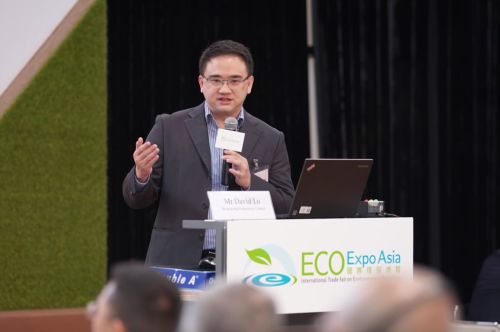
HONG KONG, Nov 4, 2019 - (ACN Newswire) - The 14th edition of Eco Expo Asia, organised by the Hong Kong Trade Development Council (HKTDC) and Messe Frankfurt (HK) Ltd, drew to a successful close last weekend at AsiaWorld-Expo. One of the highlights of the four-day expo (30 October to 2 November) was the Eco Asia Conference, which brought together business leaders from various countries and regions to exchange insights on a range of environmental issues.

The 14th edition of Eco Expo Asia, organised by HKTDC and Messe Frankfurt (HK) Ltd, drew to a successful close at AsiaWorld-Expo. The four-day expo (30 October to 2 November) featured the Eco Asia Conference at which a broad range of environmental issues was discussed. Panel sessions included "Business Opportunities under Ecological and Environmental Protection" and "Cleaner Production in the Greater Bay Area".

Ou Yuezhou, Chairman, Guangdong Association of Environmental Protection Industry, explained that the value of the environmental industry in Guangdong could reach US$1.2 trillion by 2035.

David Lo, Senior Consultant in Environmental Consultancy Services, Hong Kong Productivity Council, explained that the use of automatic environmental technologies in the production line will reduce costs and bring income growth in the long run.
One of the panel discussions at the conference was themed "Cleaner Production in the Greater Bay Area", which explored the latest green industry developments in the Guangdong-Hong Kong-Macao Greater Bay Area and gave industry players the opportunity to learn more about the latest environmental opportunities. Chaired by Raymond Fong, General Manager, Environmental Management Division, Hong Kong Productivity Council (HKPC), the panel featured Ou Yuezhou, Chairman, Guangdong Association of Environmental Protection Industry; David Lo, Senior Consultant in Environmental Consultancy Services at the HKPC; and Rakesh Vazirani, Head of Sustainability Services, TUV Rheinland Group.
Value of Guangdong green industry may reach US$1.2 trillion by 2035
The environmental industry in Mainland China effectively began in 1973 with the establishment of the country's Environmental Protection Leadership Group. The industry has grown considerably over the past 46 years and now, with the new development opportunities offered by the Greater Bay Area, is regarded as a high-value-added innovative industry with the potential for rapid growth.
Speaking at the panel session, Ou Yuezhou explained that the environmental industry and related businesses in Guangdong was valued at US$319.2 billion in 2011. With an estimated annual growth rate of 15%, this was expected to reach about $800 billion in 2018, with retail-related environmental products, services and recyclable products contributing $240 billion.
"Guangdong's green industry may reach $1.2 trillion by 2035," Mr Ou said, adding that the technologies of the green industry are innovative and mature, making it possible to export environmental services to other regions. However, he said there the mainland environmental industry is still lacking in facilities compared with the global industry.
Automatic environmental protection can lead to income growth
Speaking from the experience of the Cleaner Production Partnership Programme, which helps Hong Kong-owned factories operating in Guangdong and Hong Kong to adopt cleaner production technologies and practices, the HKPC's David Lo explained that the use of automatic environmental technologies on production lines will reduce costs and bring income growth in the long run. He noted that manufacturing processes common to many industries - including printing, coating and plastic melting - will release volatile organic compounds (VOC). The main source of photochemical smog and pollution in the Greater Bay Area comes from the combination of VOCs and the nitrogen oxides (NOx) resulting from vehicle emissions.
Industries are now finding ways to employ technology to reduce or eliminate the emission of VOCs during production. Mr Lo said: "With the support of the Cleaner Production Partnership Programme, a company can invest HK$660,000 in related equipment and reduce VOC emissions by 5.4 tonnes with a cost reduction of HK$1.16 million per year and a payback period of seven months."
TUV Rheinland Group's Rakesh Vazirani held a similar view. "Cleaner production not only reduces waste generation, but improves the efficiency of the production process, providing economic benefits," he told the seminar audience. As for the current situation regarding sustainable development, he believed that governments, manufacturers and the general population are keen to see it promoted further and are well supported by environmental groups and even funds. They are now striving to make sustainable development practical through various means, including new technologies, business models and system thinking.
Fair websites
- Eco Expo Asia: www.ecoexpoasia.com
- HKTDC's autumn trade fairs supporting services: https://home.hktdc.com/en/s/autumn-fairs-open
- Photo download: https://bit.ly/2oH7iPy
About HKTDC
The Hong Kong Trade Development Council (HKTDC) is a statutory body established in 1966 to promote, assist and develop Hong Kong's trade. With 50 offices globally, including 13 in Mainland China, the HKTDC promotes Hong Kong as a two-way global investment and business hub. The HKTDC organises international exhibitions, conferences and business missions to create business opportunities for companies, particularly small and medium-sized enterprises (SMEs), in the mainland and international markets. The HKTDC also provides up-to-date market insights and product information via trade publications, research reports and digital news channels. For more information, please visit: www.hktdc.com/aboutus. Follow us on Twitter @hktdc and LinkedIn.
Contact:
Sunny Ng, Tel: +852 2584 4357, Email: sunny.sl.ng@hktdc.org
Copyright 2019 ACN Newswire. All rights reserved. www.acnnewswire.com
